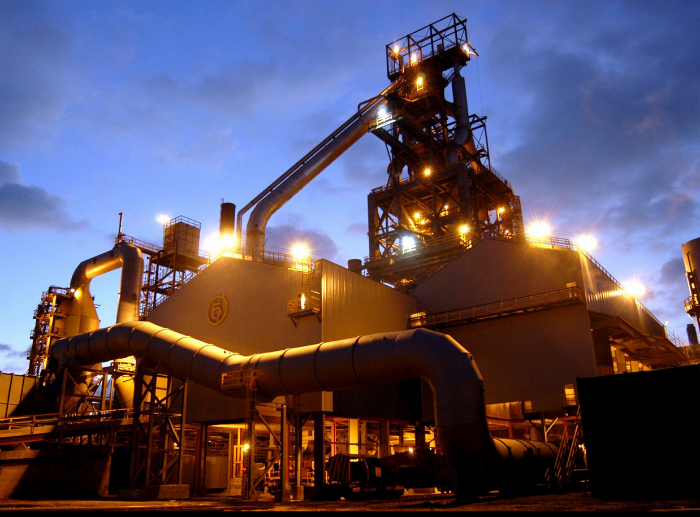A call to pray for the steel industry
The potential closure of the Port Talbot steelworks has far reaching consequences for both the people and wider community there, explains former industrial chaplain Bob Paul. Here are ways we can pray into the situation

Friends
Please pray for our steel industry, people who work in it and other people whose livelihoods depend on it. What is happening today brings back memories of my 12 years as a chaplain in the steel industry.
Early on in that time I visited Motherwell to meet with the trade union leaders in the Ravenscraig works as it was being closed and demolished. We went to express solidarity and to be briefed on the early signs that a works might be heading for closure.
Of the three works in south Wales that I visited regularly I saw Panteg close completely in two stages, first the steel plant and then the mills, and saw Llanwern lose its steelmaking section. Orb works continued much the same but reduced its workforce. I didn’t visit Ebbw Vale works regularly but shared a service with the Ebbw Vale Baptist Church on the Sunday after the announcement of the closure of that works.
A lot could be said about the way our UK plants are at the mercy of the competitive global market in steel, about Chinese companies dumping steel at prices below the cost of production, and about the high cost of energy here because of the carbon tax. But at the heart of the steel industry are people and it is people that I want to focus on here – steelworkers.
A steelworks is a community, each department and shift is a mini-community rather like a family. The complete or partial closure of a works is therefore a bereavement for all those who work in it. Workers may spend more time with the others on their shift that they do with their family. Sometimes a shift crew is more stable than a member’s marriage and there is great camaraderie.
The loss of a job that is satisfying and pays well is another bereavement. Jobs in steelworks are often more satisfying and rather better paid than others in the same area for people with similar qualifications. People may have acquired considerable skill and knowledge in their time in the works only to find that there are no jobs requiring them in the neighbourhood. They worry if they will find another job, but often have more transferable skills than they realise.
Often several members of one family have jobs in the same works. Then closure means the loss of several incomes. Then there may be worries about being unable to meet mortgage repayments and losing the family home.
Finding another job may take time and may require commuting long distances or moving home, yet another loss of community and thus yet another bereavement.
We need to remember that the troubles are not confined to the works – other companies and their employees are affected – engineering contractors, agency workers, suppliers, and customers. Many may have to make employees redundant and some may even have to close themselves.
Then before a closure there are the rumours, the uncertainties and the anxieties – do we replace the car or move house or book that holiday? When the industry was not doing very well I had to spend time demolishing rumours that were scaring people, even teaching them how to read newspaper reports critically. The present uncertainty and resultant fears are exceedingly bad for both workers and their families.
When steelmaking ceased at Llanwern some people could find similar jobs at Port Talbot works, though that involved a 40 mile commute. Others found jobs in Bristol or even Swindon, and some were lucky enough to find employment in and around Newport. The city and its other businesses did suffer but not so much as a smaller town. The part of the Llanwern site left vacant by the closure of steelmaking is now being redeveloped.
Ebbw Vales, its businesses and its people suffered more because it is a smaller town and the works provided a larger proportion of its economic activity. Again some found jobs in Port Talbot, others in Cardiff or Newport. The works site is now being redeveloped.
The prospect of the Port Talbot works being shut down is deeply worrying. The town is much smaller than Newport and the works is a much more important source of employment both directly and indirectly. Many of the other businesses in the town provide services to the works (maintenance contractors, suppliers etc) and others depend on the people employed at the works (shops, cafes etc).
So many more people are likely to be out of work, more businesses are likely to go to the wall, and there are few alternative jobs locally anyway. There is no other similar steelworks in Wales for them to go to. Communities and economies across South Wales are likely to suffer as well. And if Port Talbot goes the rest of Llanwern and other plants may follow.
I say all this not to depress or scaremonger, but to show the seriousness of the situation, the importance of prayer, and the nature of the needs.
-
So pray that, if possible, the whole works is kept open.
-
Pray for the politicians and others who are working to achieve this.
-
But then pray that, if that cannot be, considerable thought, effort and money is devoted to regenerating the local economy, supporting people financially and spiritually, and preparing them for new sorts of employment.
-
And pray that people be strengthened to cope with the uncertainty until the matter is settled.
Picture: The number 5 Blast Furnace located at the Port Talbot Steel Works/Wikimedia Commons
The Revd Bob Paul is a retired Baptist Minister who spent the last 12 years of his ministry as an industrial chaplain, mostly in steelworks
Baptist Times, 11/04/2016